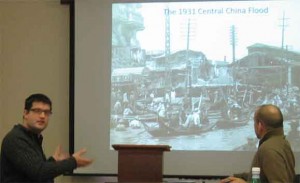In 2007 I was awarded a BICC studentship to study at the University of Manchester. The language based area studies scheme provided me with the opportunity to develop a number of key research skills. In addition to the extensive academic training I received in the UK, I also spent a year studying Chinese at Wuhan and Peking Universities. Whilst researching my PhD, I spent one and a half years conducting fieldwork in Central China. During this period I also benefitted from a postgraduate exchange with the National University of Singapore. My research to date has depended entirely upon the skills and contacts that I developed whilst on my BICC studentship.
My PhD thesis examines the social and environmental history of the 1931 Central China Flood. This disaster inundated an area the size of Britain, and caused over one million fatalities, making it probably the most catastrophic flood in world history. I draw upon a range of theoretical perspectives from anthropology, disasters studies and social and environmental history, in order to write the first comprehensive study of this event. I explore the experiences of ordinary Chinese people, describing how they died and survived during the disaster. I also examine the diverse narratives used by differing sections of the community to explain the genesis and outcome of the flood.
Having completed my BICC studentship, I was awarded a four year Junior Research Fellowship at Gonville and Caius College, Cambridge University. Whilst in this post I hope to develop my PhD research further, studying the impact of natural disasters upon Central China during the Republican and early Communist Periods. My broader research interests include the long-term interaction between human communities and the environment in the Middle Yangzi region, and the social history of the treaty port city of Hankou. I am currently conducting an oral history project into the 1954 Central China Flood.

